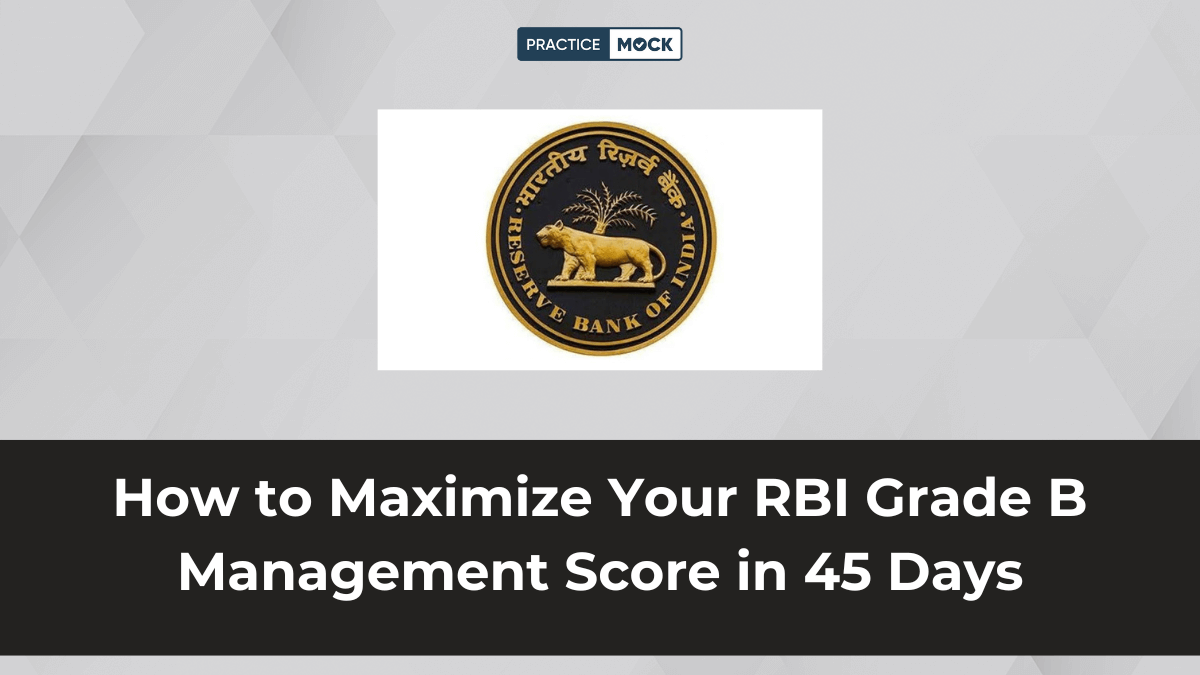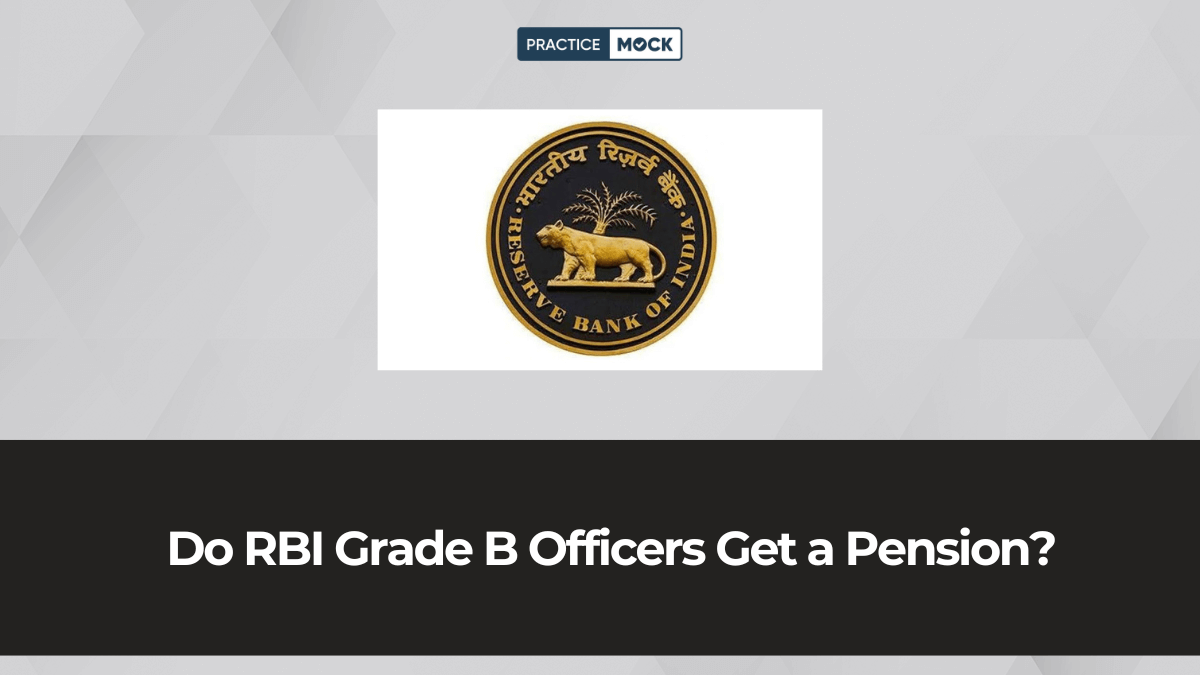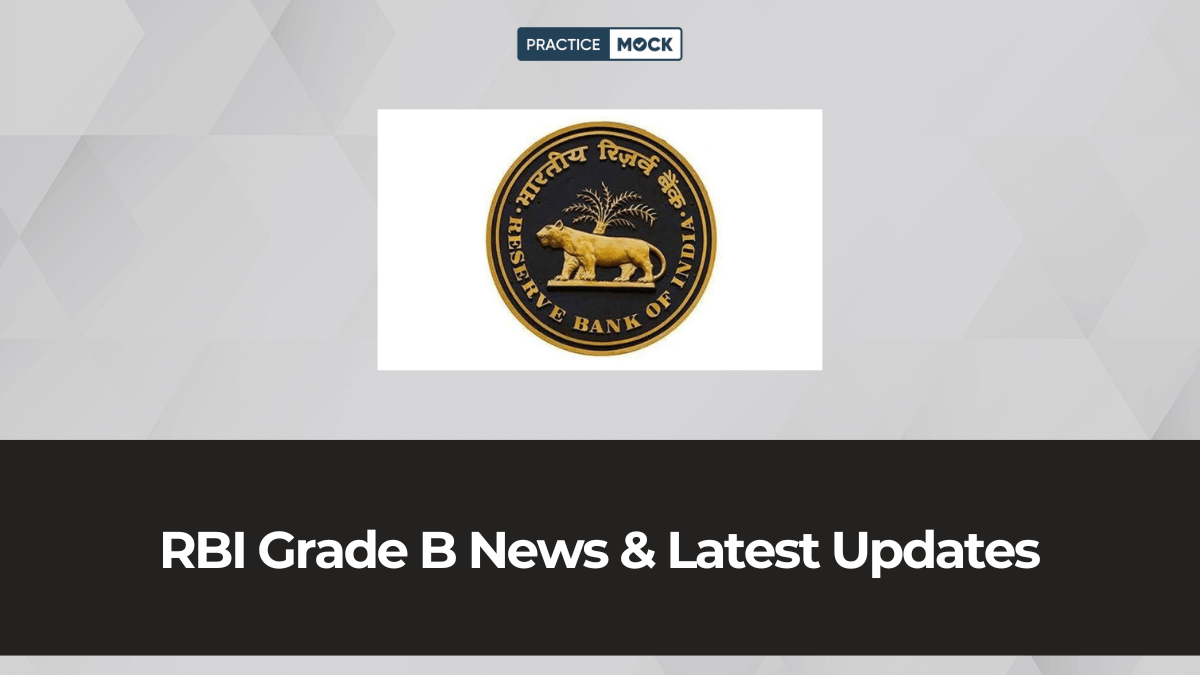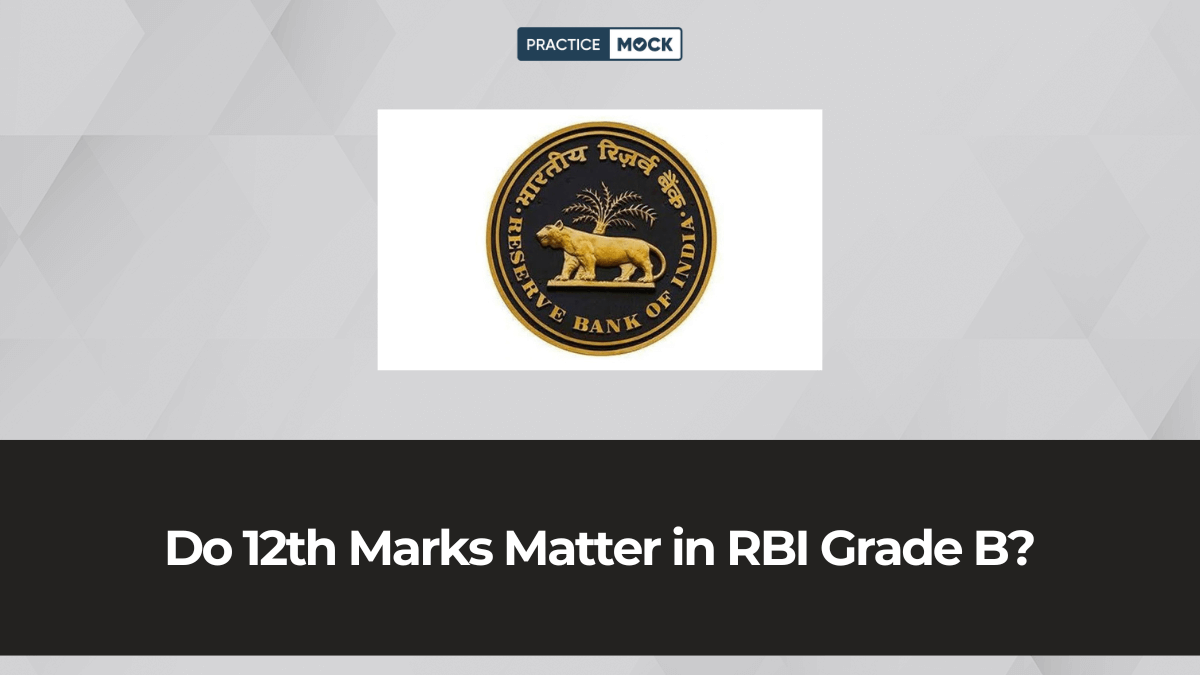How to Maximize Your Score in the RBI Grade B Management Section in 45 Days


The RBI Grade B exam is one of India’s toughest and most competitive regulatory exams, and Phase 2 is a major hurdle in clearing this exam. To overcome this hurdle and achieve success, you need to master Paper II. In this Paper, the part that can maximize your marks is the Management part. This section accounts for 20-25% of the total marks of Paper 2. Through this blog, we will provide you with a well-designed 45-day study plan to maximize your score in this important section, and we will share some effective tips that will help you answer new pattern-based questions.
Also, know why RBI Grade B Phase 1 Exam: The Silent Eliminator of 99% Aspirants & What is the Finance and Management Syllabus for RBI Grade B Exam?
45-Day Study Plan for RBI Grade B Management Section
To excel in the RBI Grade B Management section, you will need to demonstrate focus and consistency during your preparation. And if you want to master the management part within 45 days, you will need to gain mastery over its different topics each week. That is, after covering all the topics in the syllabus, you must practice various types of questions related to them. To make your preparation even better, our experts have created a week-wise 45-day plan for you. This plan not only covers important topics but also includes practice session slots at the right times. Start following it now and feel the noteworthy improvement in your preparation every week.
| Week | Days | Topics | Study Focus |
| Week 1-2 | Day 1-4 | Introduction to Management | – Study the evolution of management thought: Scientific, Administrative, Human Relations, and Systems Approach. -Practice – Understand the functions of management: Planning, Organizing, Leading, and Controlling. – Familiarize yourself with managerial roles and Nudge Theory. |
| Day 5-7 | Organizational Behaviour | – Study the Big Five personality traits and factors affecting personality. -Practice – Learn about reinforcement, perception, and perceptual errors. – Focus on content and process theories of motivation (Maslow’s, Herzberg’s, Vroom’s, etc.). | |
| Day 8-10 | Leadership and Emotional Intelligence | – Learn about various leadership theories: Trait, Behavioural, Contingency, Charismatic, Transformational, and Transactional. -Practice – Study the role of Emotional Intelligence in leadership and organizational behaviour. | |
| Week 3-4 | Day 11-14 | Organizational Change | – Study Kurt Lewin’s Change Model, Action Research Model, and Positive Model. -Practice – Understand the dynamics of organizational change and development. |
| Day 15-17 | Conflict and Communication | – Focus on the sources, types, and management of conflict. – Study communication channels, barriers to communication, and verbal vs non-verbal communication. | |
| Day 18-21 | Corporate Governance and Ethics | – Learn about ethical principles in business and the role of the board of directors. -Practice – Study corporate governance mechanisms and factors affecting governance. | |
| Week 5-6 | Day 22-28 | Practice Objective and Descriptive Questions | – Revise all the topics and practice objective questions from previous years. -Practice – Write descriptive answers to questions like “Explain the Big 5 Personality Model” and “What is Henry Fayol’s contribution to Management?” |
| Day 29-34 | Mock Tests and Case Studies | – Take mock tests focusing on the Management section to understand the exam pattern. – Analyze case studies and practice questions from books or online resources. | |
| Day 35-40 | Revision | – Revise all the chapters and focus on weak areas. – Work on writing clear and concise descriptive answers. -Practice – Practice time management in both objective and descriptive sections. | |
| Day 41-45 | Final Revision and Relaxation | – In the last few days, focus on revising key concepts and strategies. – Take Phase 1 mock tests to assess your performance. – Ensure you are mentally prepared and relaxed for the exam. |
NOTE: This study plan is not perfect. Every candidate has their style of studying, and their daily schedule is also different. Especially those who, either due to their job, cannot study in the afternoon or are forced to study in the evening or night for some other reasons. Therefore, you can make any changes to it according to your convenience.
Master the Art of Facing New Pattern-Based Questions
Candidates need to be prepared to face the new pattern-based questions that will come in the management section. Earlier, to answer management-related questions, candidates used to memorize the theory and the answers based on it. Now, the pattern of the questions has changed. Now, the questions are more logically based. Therefore, for this, candidates need more strategic preparation and critical thinking.
For instance, earlier, a theory would be given, and questions would be asked directly about that particular theory. Now, a scenario is given, and questions are based on it. For example, a scenario of an office might be given, and the question might be asked which of Maslow’s theories would apply to this office scenario.
5 Tips to Make the Most of the 45-Day Plan
To master the Management part, or to maximize your score in it, you will need to understand the concepts in depth, practice different case studies, sharpen your analytical skills, and significantly improve your time management skills and accuracy. If you start following the 45-day study plan given above, along with the tips mentioned below, you will achieve mastery over all the management topics in 45 days and will be able to easily maximize your score.
1. Understand the Concepts Deeply
The first thing you need to do is to thoroughly understand the management-related concepts. The new pattern questions that appear in the exam test your understanding of concepts, not your rote memorization. Therefore, instead of memorizing definitions, you should deeply understand different theories and management models, so that you can solve questions related to them, such as theories like Maslow’s Hierarchy of Needs, Vroom’s Expectancy Theory, etc.
2. Practice Case Studies
Case study-related questions have now become common in the Management part. Therefore, try to regularly practice case studies related to leadership, organizational change, and conflict resolution. Because the more you practice with focus, the more your ability to think critically will increase, and you will be able to quickly apply your newly acquired theoretical knowledge to real-world scenarios. In other words, you will be able to attempt questions quickly and accurately.
3. Improve Your Analytical Skills
The questions in the Management section, as we discussed above, can be tricky. These questions may test your analytical skills. Therefore, practice is very important. For this, you will need to continuously improve your ability to understand and answer difficult management scenarios quickly. For this, practice different types of management-related questions and analyze each question thoroughly and quickly but accurately before arriving at a well-supported answer.
4. Enhance Your Time Management and Accuracy
Remember that the question paper setters design new pattern questions in such a way that the candidate gets confused and takes time to answer. This is done so that your preparation can be tested properly. Therefore, you need to start training your mind now to analyze the questions quickly, eliminate irrelevant options, and reach the correct option, i.e., the answer. For this, you need to practice such questions. So, start trying to master this art through mock tests and quizzes. Take a free Phase 1 mock test through the link provided above and learn how Phase 2 mock tests can enhance your ability twofold by day and fourfold by night.
5. Stay Calm Under Pressure
This part may have some tricky questions that might confuse you. So, you need to train your brain through practice and mock test training to remain calm while attempting questions and think logically. This training will help you apply all the concepts that you have learned with confidence.
Sample Questions for Practice
Check out the sample questions below to get a perfect idea about the type of questions that you might face in the real RBI Grade B 2025 exam’s management part:
Descriptive Question:
Question. Explain the techniques of Scientific Management, as specified by Frederick Taylor. Map each of these techniques with a suitable sector or industry.
Demand of the question: Knowing about the Techniques Scientific Management and linking it up with the different sectors of the industry.
Structure of the Answer:
Introduction: Explain the characteristics of Scientific Management in brief. (100 words)
Body: Enlist all the techniques of the Scientific Management and find a suitable industry. Also explain the rationality behind the selection of the Sector. Besides, explain how the respective techniques would help that industry. (400 words)
Conclusion: Summarize the answer by highlighting the importance of Scientific Management in Industry. (100 words)
Objective:
Question. As per Daniel Goleman’s Six Emotional Leadership Styles, leaders should have the ability to deal with the changing environment on the work floor. Out of the six styles, one of the styles has the following characteristics.
- Many times, the leader serves as an example. The members of a team are next expected to deliver the desired quality of work.
- Leaders expect the team to work independently and usually only require weekly or monthly updates about the status of a project. Team members are because of their independence expected to deliver excellent results.
- Leaders with this leadership style usually work in a highly competent team with team members who are highly engaged.
- It is needed when a leader needs quick results, often associated with sales and marketing targets.
Identify the Style!
1) Coaching Leader
2) Pacesetting Leader
3) Commanding Leader
4) Affiliative Leader
5) Visionary Leader
Answer Key: 2
Solution:
Pacesetter Leadership
This leadership style of Daniel Goleman Leadership Styles is concerned with results and high-quality work.
Many times, the leader serves as an example. The members of a team are next expected to deliver the desired quality of work.
Leaders expect the team to work independently and usually only require weekly or monthly updates about the status of a project. Team members are because of their independence expected to deliver excellent results.
Leaders with this leadership style usually work in a highly competent team with team members who are highly engaged.
It is needed when a leader needs quick results, often associated with sales and marketing targets.
This style epitomizes high-performance teams and allows motivation and competence to be self-developed and self-driven. It works when team members are committed and competent, so the leader can drive results through target-setting, fast-paced creative projects, and setting the example of the pace to be worked.
Conclusion
The RBI Grade B Management section can be called the heart of Paper II. And, if you smartly prepare this part over the next 45 days, you can score well in this important section. This is why our subject experts have crafted the above 45-day plan for you. So, get started, practice daily, and prepare all the theories and concepts in such a way that you can easily solve the new pattern of questions without any confusion. Remember, if you make an effort to understand all the concepts in depth daily, practice various case studies regularly, and continue improving your analytical skills, you will increase your overall Paper 2 score through this part. Believe in yourself, work hard, and success will surely knock at your door.
Dont forget to check out the video below to get more insights on maximizing your score in the Management part:
Recent Posts
RRB NTPC Syllabus 2025, Topic wise Weightage, Download PDF
In this blog, we have provided the RRB NTPC syllabus 2025 with RRB NTPC topic-wise…
150+ Arithmetic Questions for RRB PO Based On Previous Year Papers
In this article we are providing the 150+ Arithmetic Questions for RRB PO Based On…
Do RBI Grade B Officers Get a Pension? Know Before You Start Preparing
Before preparing for RBI Grade B, understand the pension policy, long-term benefits, and how it…
RRB ALP Eligibility Criteria 2025: Qualification, Age Limit, and Other Details
In this blog, we have provided the RRB ALP Eligibility Criteria 2025 which includes Qualification,…
RBI Grade B Latest Updates, Everything You Should Know
Get the latest RBI Grade B updates, including notification dates, eligibility, syllabus, and exam pattern.…
BOB Office Assistant Syllabus 2025, With Latest Exam Pattern
Bank of Baroda Office Assistant syllabus 2025 covers the latest exam pattern for the aspiring…




